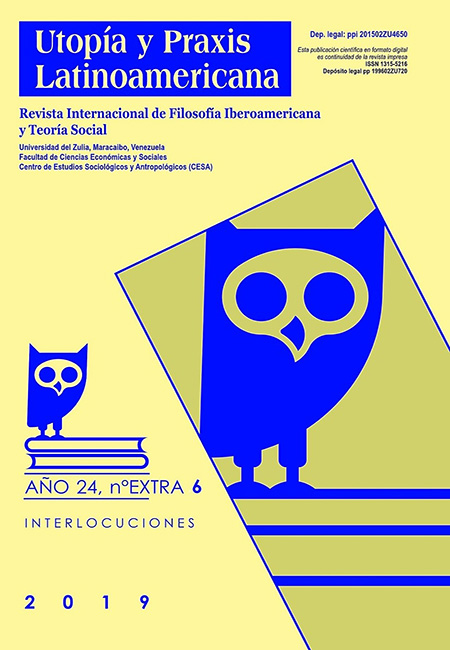Prevention of mens rea corruption of prospective legislators in Indonesia from a psychological perspective
Resumen
ABSTRACT
The purpose of this study is to analyze how to prevent mens rea corruption candidates for legislators in Indonesia with a psychological approach with the concept of conformity. The results showed that there were legislative candidates who had received permanent verdicts as corruptors but nominated themselves as legislative members. Psychology approach emphasizes the aspect of mens rea. Simultaneously in addition to a juridical approach in the form of punishment, also a psychological approach in the form of inculcation of local cultural values, and to be effective, real cooperation is carried out between the government, business activists, and academics.
RESUMEN
El propósito de este estudio es analizar cómo prevenir los candidatos de corrupción mens rea para legisladores en Indonesia con un enfoque psicológico con el concepto de conformidad. Los resultados mostraron que había candidatos legislativos que habían recibido veredictos permanentes como corruptores, pero se nominaban a sí mismos como miembros legislativos. El enfoque psicológico enfatiza el aspecto de mens rea. Simultáneamente, además de un enfoque jurídico en forma de castigo, también un enfoque psicológico en forma de inculcación de valores culturales locales y, para ser efectivo, se lleva a cabo una cooperación real entre el gobierno, los activistas empresariales y los académicos.
Citas
AIDT, TS (2009). “Corruption, institutions, and economic development”. Oxford review of economic policy, 25(2), pp. 271-291.
ANDERSON, CJ, & TVERDOVA, YV (2003). “Corruption, political allegiances, and attitudes toward government in contemporary democracies”. American Journal of Political Science, 47(1), pp. 91-109.
ANNÍA G, María Eugenia., VILLALOBOS ANTÚNEZ, José Vicente., ROMERO PABÓN, Julio Cesar., RAMÍREZ MOLINA, Reynier Israel., & RAMOS MARTÍNEZ, Yanelis. (2018). “Conciencia ética en organizaciones universitarias: un estudio fenomenológico de la praxis como continua formación”. In Revista Inclusiones, 5(4), pp. 179-195.
BARR, A, & SERRA, D (2010). “Corruption and culture: An experimental analysis”. Journal of Public Economics, 94(11-12), pp. 862-869.
FARRELL, G (2010). “Situational crime prevention and its discontents: Rational choice and harm reduction versus ‘cultural criminology’”. Social Policy & Administration, 44(1), pp. 40-66.
KALOGEROPOULOS, P, RUSSO, JA, SULLIVAN, P, KLOOGER, M, & GUNNINGHAM, S (2020). “Re-enfranchising Mathematically-alienated Students: Teacher and Tutor Perceptions of the Getting Ready in Numeracy (G.R.I.N.) Program”. International Electronic Journal of Mathematics Education, 15(1).
KENNY, C (2006). Measuring and reducing the impact of corruption in infrastructure. The World Bank.
KOLSTAD, I, & WIIG, A (2009). “Is transparency the key to reducing corruption in resource-rich countries?”. World Development, 37(3), pp. 521-532.
KUNICOVA, J (2006). “Democratic institutions and corruption: incentives and constraints in politics”. International handbook on the economics of corruption, 1, pp. 140-160.
KUNICOVA, J, & ROSE-ACKERMAN, S (2005). “Electoral rules and constitutional structures as constraints on corruption”. British journal of political science, 35(4), pp. 573-606.
LAMBSDORFF, JG (2007). The institutional economics of corruption and reform: Theory, evidence and policy. Cambridge university press.
LAUREANO, RMS, FERNANDES, AL, HASSAMO, S, & ALTURAS, B (2018). “Facebook Satisfaction and Its Impacts on Fundraising”: A Case Study at a Portuguese Non-Profit Organization. Journal of Information Systems Engineering & Management, 3(1), pp. 4-7.
MARTÍNEZ, Suyis; RAMOS MARTÍNEZ, Yanelis & ANNÍA, María Eugenia. (2019). El coaching en educación. Utilidad para la transformación escolar mediante sistematización de experiencias. In Opción. Revista de Ciencias Humanas y Sociales. Año 35, No. 89-2: 1388-1439. Universidad del Zulia. Maracaibo (Venezuela).
MOHAMMADI, S, & YEKTA, P, (2018). “The Effect of Emotional Intelligence on Job Satisfaction among Stuff Nurses in Intensive Care Units”. UCT Journal of Social Sciences and Humanities Research, 6(2), pp. 1-7.
NOORADI, M, BAGHERI NIA, H, & OULIAEY, A (2017). “Are the manager's bases of power related to job satisfaction?” UCT Journal of Management and Accounting Studies, 5(3), pp. 71-75.
RAMOS MARTÍNEZ, Yanelis. (2007). Estrategias de la gestión directiva y construcción de la grandeza docente en las escuelas bolivarianas. In Revista electrónica de humanidades, educación y comunicación social, (REDHECS). Edición 2, año 2.
PAKDEL, M, & ASHRAFI, M (2019). “Relationship between Working Capital Management and the Performance of Firm in Different Business Cycles”. Dutch Journal of Finance and Management, 3(1).
PIGA, G (2011). “A fighting chance against corruption in public procurement”. International handbook on the economics of corruption, 2, pp. 141-181.
SUNG, HE, & CHU, D (2003). Does participation in the global economy reduce political corruption? An empirical inquiry.
TANZI, V (1998). “Corruption around the world: Causes, consequences, scope, and cures”. Staff Papers, 45(4), pp. 559-594.
TREISMAN, D (2000). “The causes of corruption: a cross-national study”. Journal of public economics, 76(3), pp. 399-457.
VAN RIJCKEGHEM, C, & WEDER, B (2001). “Bureaucratic corruption and the rate of temptation: do wages in the civil service affect corruption, and by how much?”. Journal of development economics, 65(2), pp. 307-331.









